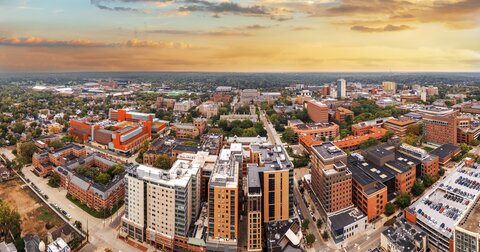Ann Arbor mulls green energy mandates as housing costs soar
‘Ann Arbor’s City Council is working against itself,’ expert warns
Ann Arbor's City Council is considering a green-energy housing ordinance that would increase red tape and expenses for rental housing owners at a time when the council is also concerned about a lack of affordable housing in the city.
The proposed Green Rental Housing Ordinance aims to enforce new energy standards on rental housing. The plan, which had its first reading at the June 2 council meeting, imposes additional red tape and financial burdens that experts say would reduce Tree City’s rental stock, particularly for low-income residents, and raise rents.
Landlords would have to meet a qualifying “Asset Rating” through either a prescriptive checklist or a third-party energy rating system before each routine rental inspection. A landlord who fails to comply could be prohibited from obtaining or renewing a rental license.
Violations could result in civil fines of $500 for a first offense and $1,000 for subsequent offenses, plus the cost of prosecution, according to the draft language.
An association for landlords warns that the ordinance will cause trouble. “While we understand the intent behind this initiative, the Washtenaw Area Apartment Association firmly believes it will have far-reaching and devastating consequences for students, tenants, and property professionals in Ann Arbor,” James Nichols, the organization’s executive director, told Michigan Capitol Confidential via email.
Costly upgrades required by the ordinance will lead to higher rents, Nichols said. “This will not only hurt tenants, but price many students and tenants out of their homes.”
Members of the city council say they are grappling with a housing crisis, according to an April 2024 report by Michigan Daily.
Some observers say the ordinance makes it harder to make housing more affordable.
“Ann Arbor’s City Council is working against itself,” Jason Hayes, director of energy and environmental policy at the Mackinac Center for Public Policy, told CapCon. "They’re pushing for more affordable housing while imposing green ordinances that raise costs for landlords and limit rental options.”
Hayes cited mandates for all-electric systems that add tens of thousands in upfront costs for homeowners and landlords, pricing out low-income residents.
Ann Arbor Mayor Christopher Taylor defended the proposal.
“The proposed Green Rental Housing ordinance sets reasonable and attainable standards that will improve tenant expense and comfort, without overburdening landlords,” Taylor wrote to CapCon in an email.
City Council Member Jen Eyer echoed Taylor’s view, stating in an email to CapCon that the ordinance is crafted to improve conditions for renters without sacrificing affordability.
“Ann Arbor’s housing affordability challenges are serious — and so is the climate crisis,” Eyer wrote. The city can’t tackle one issue while ignoring the other, she added.
Improving energy efficiency in rental housing will reduce financial burdens on tenants, Eyer said.
Michigan Capitol Confidential is the news source produced by the Mackinac Center for Public Policy. Michigan Capitol Confidential reports with a free-market news perspective.


 Grand Rapids climate plan sparks tax, business fears
Grand Rapids climate plan sparks tax, business fears
 Ann Arbor Summertime Festival rakes in the cash from U of M, state taxpayers
Ann Arbor Summertime Festival rakes in the cash from U of M, state taxpayers
 Ann Arbor spent $4.5 million of its ARPA funds on solar panels
Ann Arbor spent $4.5 million of its ARPA funds on solar panels